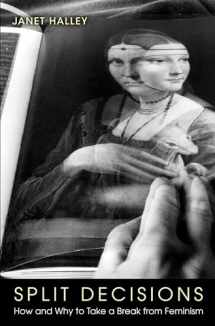
Split Decisions: How and Why to Take a Break from Feminism
Book details
Summary
Description
Is it time to take a break from feminism? In this pathbreaking book, Janet Halley reassesses the place of feminism in the law and politics of sexuality. She argues that sexuality involves deeply contested and clashing realities and interests, and that feminism helps us understand only some of them. To see crucial dimensions of sexuality that feminism does not reveal--the interests of gays and lesbians to be sure, but also those of men, and of constituencies and values beyond the realm of sex and gender--we might need to take a break from feminism.
Halley also invites feminism to abandon its uncritical relationship to its own power. Feminists are, in many areas of social and political life, partners in governance. To govern responsibly, even on behalf of women, Halley urges, feminists should try taking a break from their own presuppositions.
Halley offers a genealogy of various feminisms and of gay, queer, and trans theories as they split from each other in the United States during the 1980s and 1990s. All these incommensurate theories, she argues, enrich thinking on the left not despite their break from each other but because of it. She concludes by examining legal cases to show how taking a break from feminism can change your very perceptions of what's at stake in a decision and liberate you to decide it anew.


We would LOVE it if you could help us and other readers by reviewing the book
Book review




